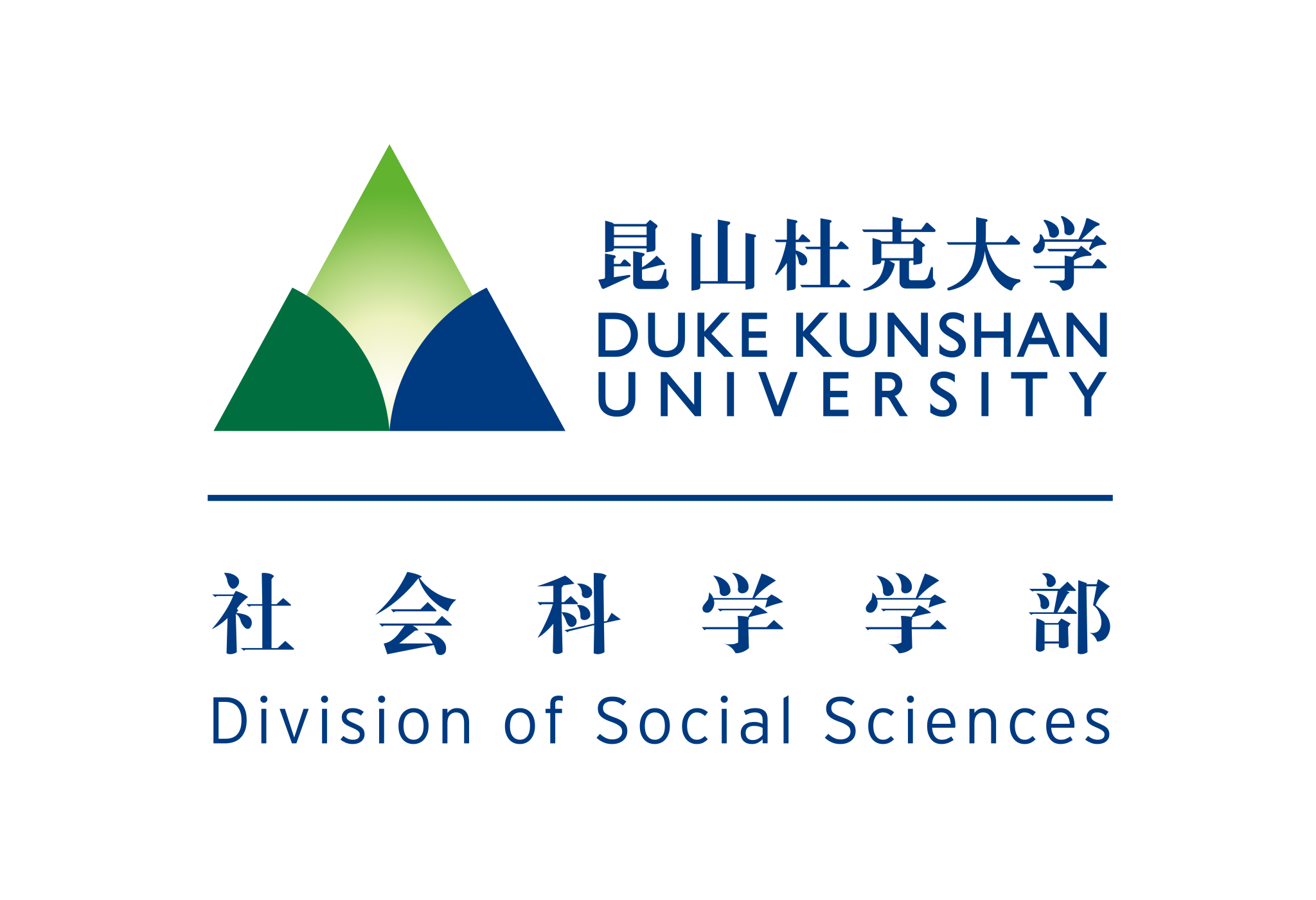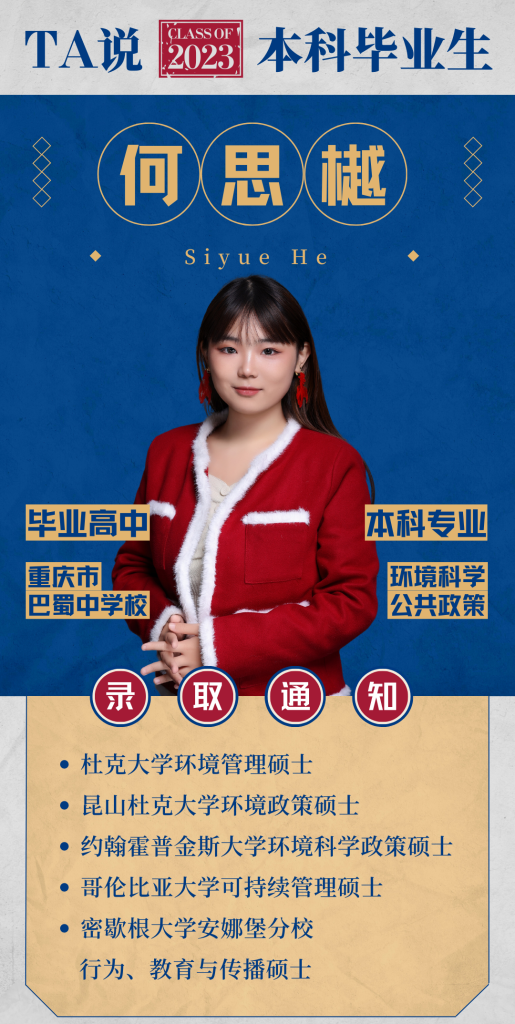
01 Why DKU?
DKU’s multicultural and interdisciplinary learning and living environment attracted me very much. Here, I can explore different academic fields more thoroughly and even subversively; here, I don’t have to choose an undergraduate major immediately after graduating from high school but can better tap my potential and express my personality. More importantly, students, professors and staff from different countries and with different backgrounds can become my confidants and friends, allowing me to observe and experience cultural and social changes from a broader perspective.
02 Stories About My Major And Me
Since high school, I have been very interested in geography and environmental governance. My geography teacher, Ms. Yang, is a good mentor in my journey of exploring academic interests. Her patient teaching and academic passion gave me the idea of studying environmental science. However, after coming to DKU, I really began to understand and think about the meaning of Environmental Science to me.
In the Applied Environmental Science course at DKU, I learned about the global challenges facing today’s society: from the reduction of diversity, desertification, air pollution and other problems faced by the ecosystem itself, to the challenges of AI to urban greening and environmental justice, China and the world are suffering huge social losses due to global warming and the uneven distribution of environmental and economic resources. How to reasonably allocate and redistribute contemporary and intergenerational resources has become an issue that I continue to think about and explore.
I began to have a strong interest in sustainable development. From sponge cities to circular economy, I gradually strengthened my determination to study Environmental Science and began an exploration journey on and off campus in solid waste management. Solid waste management, in layman’s terms, is how to “carefully arrange” the first and second half of the life of resources. In the circular economy model, resources are a cyclic process from generation, distribution, waste, regeneration to redistribution, rather than a linear “generation-distribution-waste” life cycle. Solid waste management is an important and indispensable part of achieving efficient resource circulation. I hope to join China’s “waste classification” reform as a learner, participant and contributor to help China go further on the path of sustainable development.
03 Plans After Graduation
I often feel lucky to have chosen DKU and met so many like-minded people. But I also know that choosing Environmental Science is not an easy path. Every time I see those shocking data – the rising global average temperature and sea level, the decreasing forest area and available resources, I feel powerless, thinking that even if I learn and do it now, it seems difficult to change the trend of environmental deterioration. So, I admire those who are determined to fight on this road: no matter how many disappointments they have experienced, they still pick themselves up and walk alone, just to see that little bit of light through the darkness. On my 21st birthday, I silently made a wish: Maybe I can be such a person? I will continue to walk because of that little bit of light, right?
Therefore, I decided to continue to study sustainable management at Columbia University after graduation to enrich my knowledge in environmental and social sustainable development; at the same time, I hope to make friends with people with different identities in New York, a cultural melting pot, and understand the significance of environmental protection and solid waste management to different groups from multiple dimensions.
04 Significant Research Experience
I have been studying the application of Nudge Theory in behavioral science in the field of environment since my junior year. Nudge Theory studies how to change the decision-making environment of people, thereby changing the decision-making and behavior of groups or individuals. A well-known experiment related to it is the plate experiment: by reducing the diameter of the plates in the cafeteria and limiting the amount of food people take, the restaurant’s food waste was reduced by 22%.
From the 1980s and 1990s when Japan began to implement the garbage sorting policy, to now when every household can sort garbage more strictly and self-disciplinedly, Japan has gone through a long 30 years to educate and cultivate a new generation of excellent “garbage sorting families”. It can be seen that for China, with a population of 1.4 billion, garbage sorting is a protracted battle. It is difficult to achieve the goal of efficient sorting of garbage recycling in a short period of time by relying solely on education and policy guidance. Therefore, the Nudge Theory in Behavioral Science will be used as a possibility to allow people to better form the awareness of garbage sorting through what they see and hear.
In my Signature Work, I independently designed an experiment to evaluate the impact of boost stickers on garbage sorting behavior: I first designed standardized and anthropomorphic (borrowed from the well-known IP Plants vs. Zombies) trash can boost stickers corresponding to four classification criteria: hazardous, recyclable, kitchen waste and other garbage. Then, I put the stickers on the corresponding trash cans and garbage, hoping to attract people’s attention through interesting stickers and narrow the gap between cognition and reality. The results also showed that boost stickers can indeed improve the accuracy of personal garbage sorting.
In the process of obtaining research funds, conducting experiments, and writing graduation papers, I actively discussed research ideas with my supervisor, designed boost stickers, informed consent forms and posters, and independently drafted IRB proposals. My reading, writing and critical thinking skills have been substantially improved.
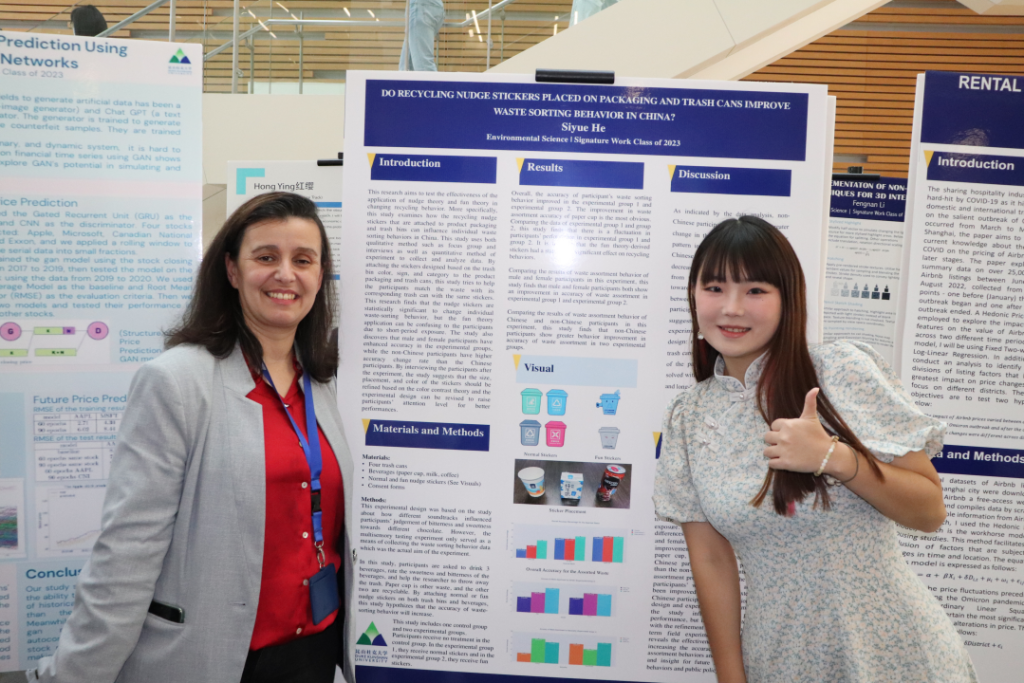
With my supervisor at the landmark project exhibition
05 Rich Internship Experience
With curiosity and enthusiasm for improving China’s solid waste management system, I started my junior summer internship at Sanfeng Environmental Group, a high-tech company that uses garbage incineration to generate electricity. Instead of working in an office environment in the main city, I chose to do an internship in a factory in the mountains to learn more about the whole process of waste reduction, sewage discharge, power generation, and pollution and impurity removal. During the internship, I served as a tour guide assistant at the company’s exhibition hall to lead domestic and foreign tourists to visit the factory and cooperated with senior engineers to conduct daily factory inspections and reports, which exercised my communication and teamwork skills.
This internship experience has always been fresh in my memory, not only because the canteen of Sanfeng Power Plant is delicious and the mosquitoes there are poisonous, but also because of those colleagues who are brave enough to move forward and guard their original intentions. The summer in Chongqing has always been hot, and it is also stuffy after heavy rain. However, the engineers in the factory need to wear thick work clothes in the hot summer and wear gas masks to perform maintenance next to the closed incinerator. Their work clothes are often stained with the smell of garbage corruption, which in my clear memory is like the smell of old pickled cabbage that has been soaked for 20 years. I was also puzzled: how could they ignore the stench and concentrate on working next to the incinerator that was like a sea of fire?
A colleague who suffered from heatstroke next to the incinerator but still insisted on working told me that this was his duty and there was no way to shirk it. After saying that, I felt his helplessness; but he turned and continued to say that this was also what he wanted to do. He wanted to make the machines in the factory run more smoothly and create a safer working environment for other colleagues. He didn’t say any more sensational words, but the sentence “This is what I want to do” was enough to answer my question.
Under the “attack” of garbage smell that ordinary people can’t stand, and even don’t want to smell it, my colleagues have always been able to move forward despite difficulties and fight again and again. In the next few weeks, I also began to face this smell, no longer avoiding it, and no longer feeling unhappy, but just a little distressed.
I found that group of people again, the group of people groping for light in the dark. I just hope that in the near future, the group of people who have dedicated themselves to solid waste management, whether it is my colleagues or other people who are fighting hard against garbage on the front line, their living conditions and physical and mental health can be paid more attention. They need equal environmental justice.
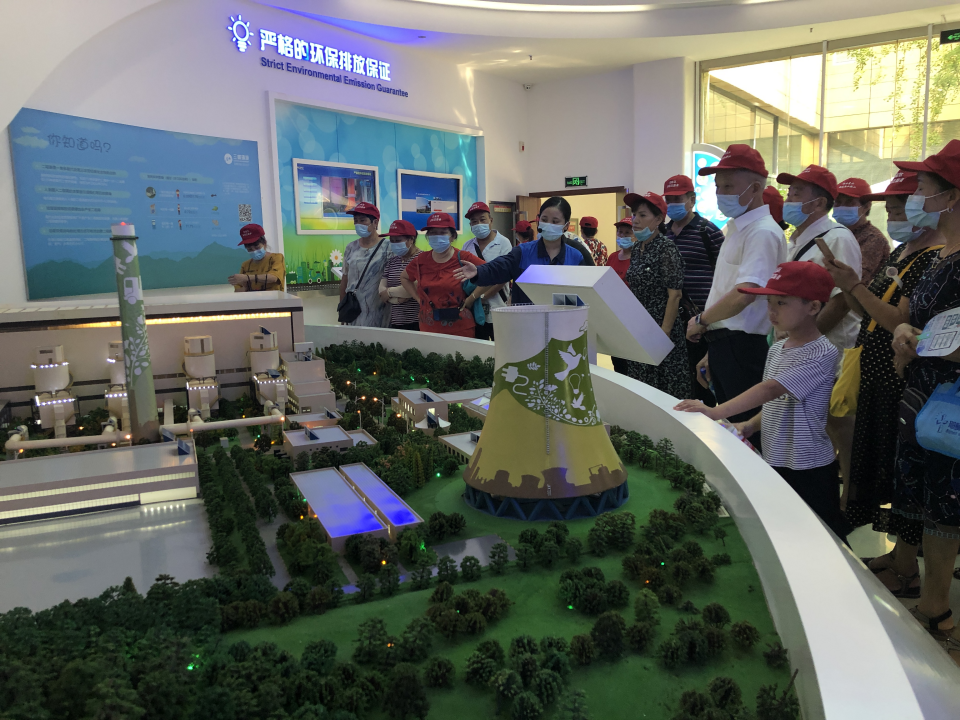
Leading Chongqing citizens to visit the exhibition hall with the factory’s staff
06 Inspiring Cross-cultural Experience
Studying at DKU, I was able to grow with Professors and students from more than 40 countries around the world. They also brought me countless academic and cultural shocks and deepened my understanding and empathy for different cultures.
In my freshman year, I co-founded a bilingual online cross-cultural magazine (Intersections: An online journal of language, culture, and ideas /《交集》) with Professor Austin Woerner, which included articles and interviews written by DKU members in their second or third language. As a co-founder, I interviewed students from all over the world and wrote the interviews into bilingual articles for Chinese and foreign readers. The topics of the interviews were very wide-ranging: from Ramadan in Morocco, to the Orthodox Easter traditions in Ukraine, to the Spanish rap battle in Latin America. The rich and unique personal memories of my classmates enriched my understanding of the world and also created my dream of learning and growing in a cross-cultural environment throughout my life.
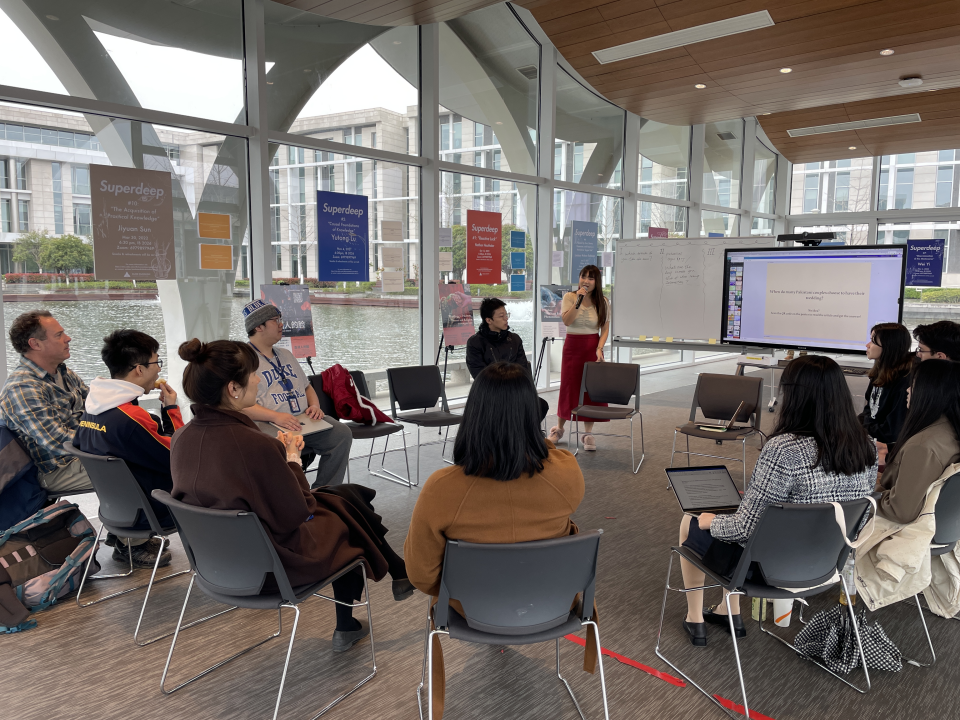
As a co-founder, I hosted the book sharing session of “Intersection”
In the process of communicating with other international students, I also learned about the hardships of people in third world countries and the war traumas that my friends experienced personally. I will never forget the facial expressions of my Burmese friend when he talked about the bombing that happened a few hundred meters away from his home – it was an expression that adapted to the life of war and chose to face it calmly. I will also never forget that on my 21st birthday, the Russian-Ukrainian conflict broke out and one of my best friends, Tanya, was trapped in Kiev with nowhere to escape. We promised in her 20th birthday that we would meet in the near future. Unexpectedly, due to the epidemic and the war, the “near future” was delayed – that was also the first time I felt that when a person really connects with another person, she will experience the pain of fear of loss.
After learning about the stories of DKU classmates, I feel very lucky and grateful to be able to live in a peaceful country in this war-torn era. I also realized that I have a responsibility to cherish the educational resources I have and hope to do something for people in difficult situations in the future.
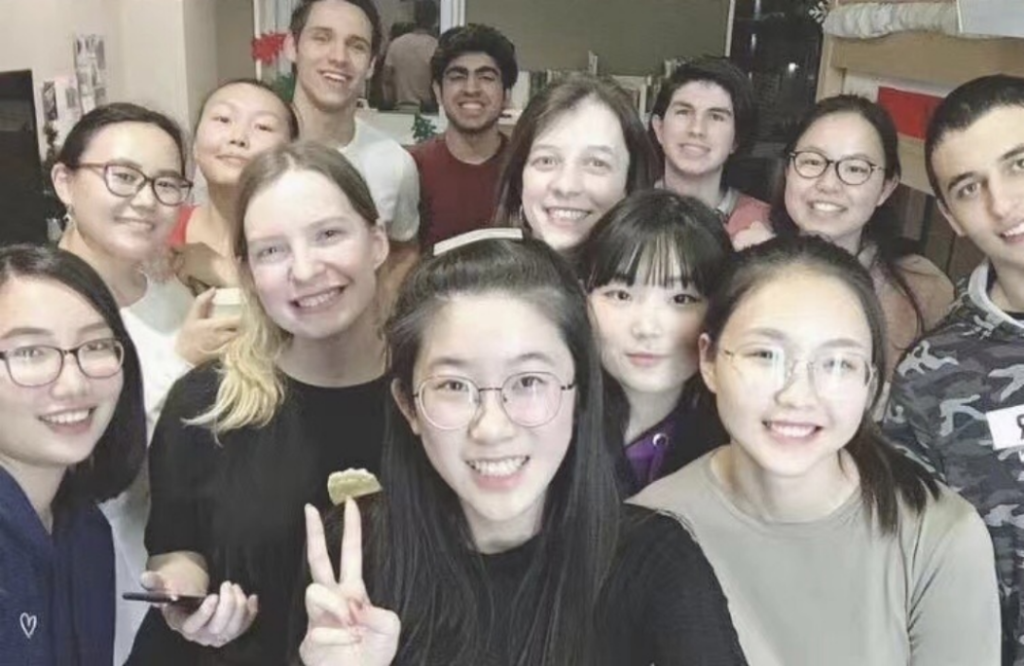
At Tanya’s birthday party with friends
07 Why Love DKU?
I really love the diversity and inclusiveness of DKU. I met my best friends here, and learned so many valuable qualities from them, and also got precious life inspiration. Some of my friends are in bands, some are philosophers, and even monkeys (this is a joke, but their experimental subjects are monkeys). Their different and interesting views on the world are always refreshing. I enjoy the magic of DKU that allows students to discuss freely and think divergently. Because of this, I have become more open and independent and can better express myself from the perspective of a global citizen.
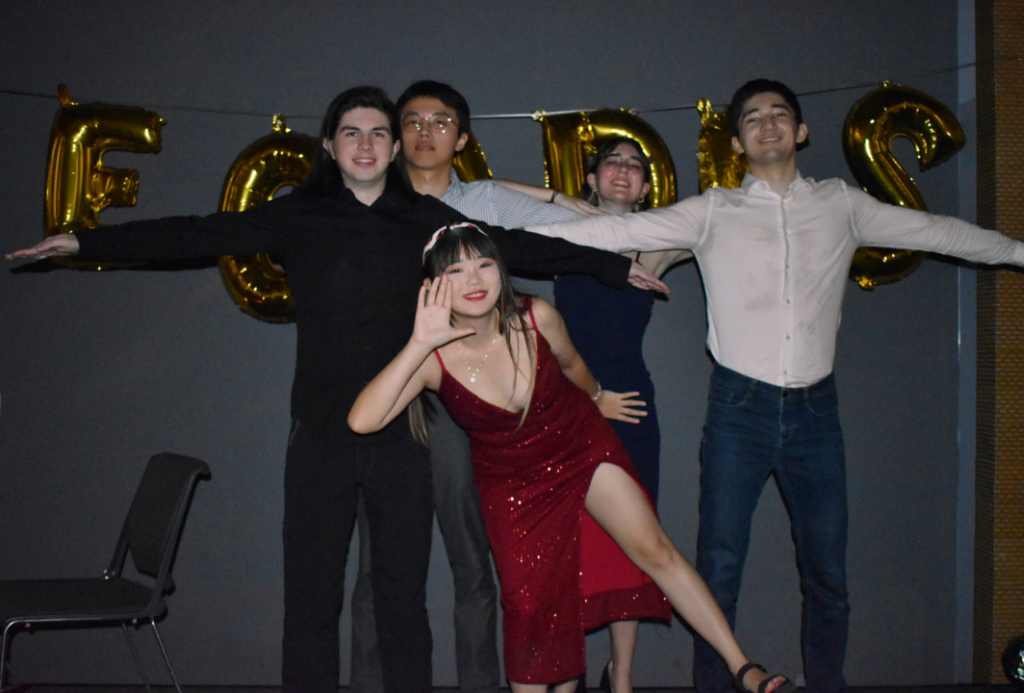
Attending dance night with friends
08 Suggestions To Fellow Students
Be brave. Be brave to do what you want to do and be brave to try new things. Don’t be imprisoned by the so-called secular views. Challenge yourself and the rules and regulations set by society while you are young. It is really important to be brave to try, and taking the first step requires you to be braver.
Be open-minded. In the multicultural context of DKU, everyone will face cross-cultural communication problems to a greater or lesser extent. Especially when international students communicate with Chinese students, there may be some conflicts due to language barriers. I hope that students can look at problems with an attitude as tolerant as possible, learn appropriate communication and expression methods, and reduce stereotypes of others. Openness is an attitude, being good at communication is a skill, and being brave enough to point out prejudices is an art. I hope that everyone can grow healthily and vigorously at DKU, of course on the basis of resolving misunderstandings and prejudices.
Translated and Edited by Zhenyu Tian, Class of 2027
